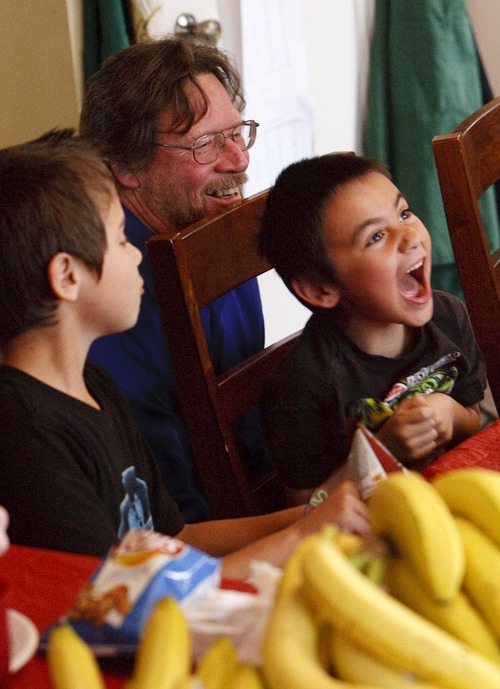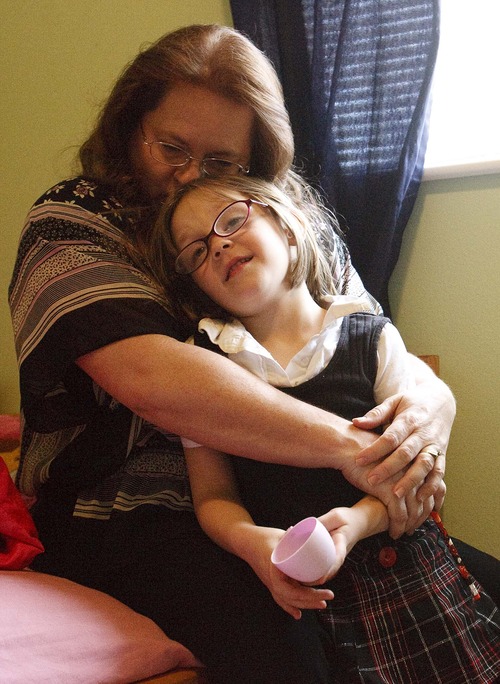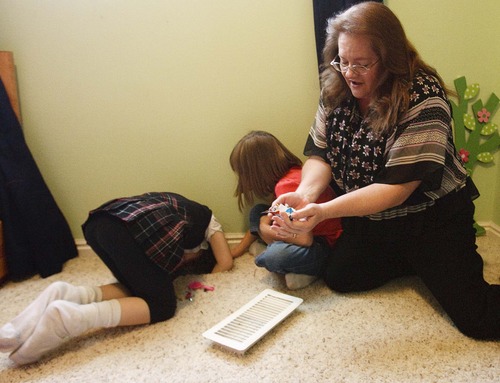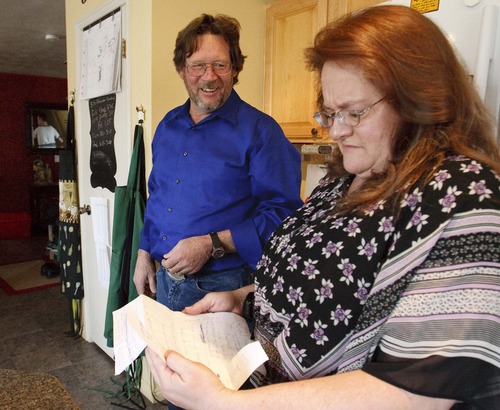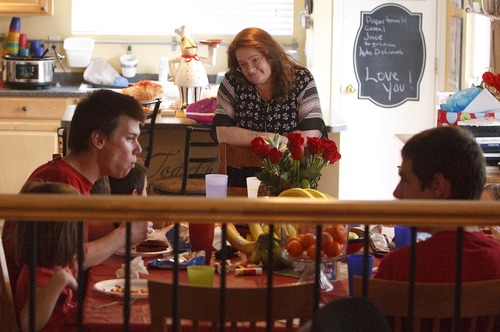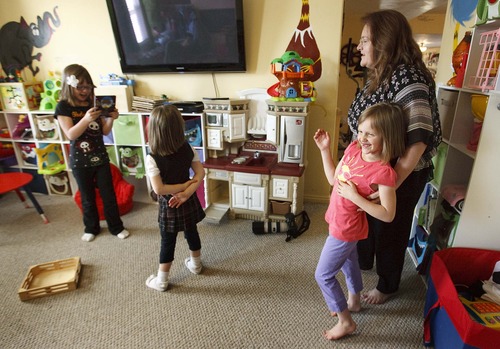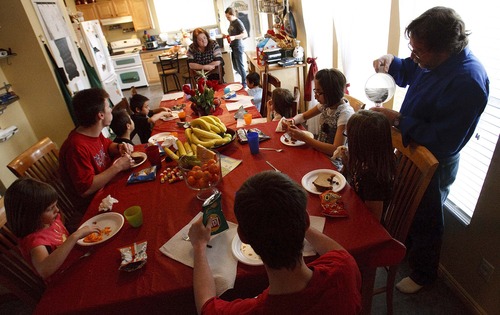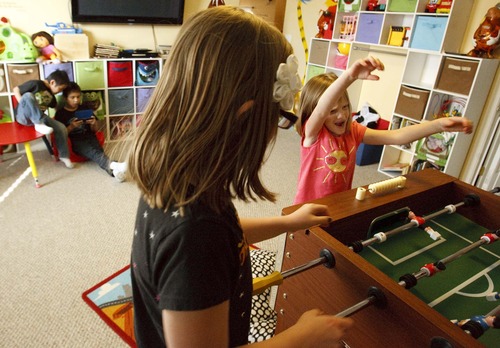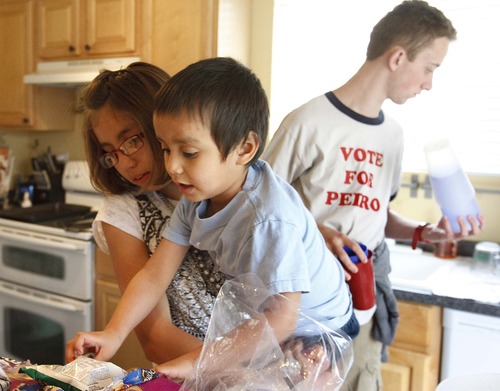This is an archived article that was published on sltrib.com in 2013, and information in the article may be outdated. It is provided only for personal research purposes and may not be reprinted.
Layton • After enduring a troubled upbringing and becoming a foster child as a teen, Suzanne Larson knew that her life could go one of two ways.
"You either grow up like your parents or the polar opposite," she said.
Larson chose the polar opposite. That decision led her to marry a man who loves kids, to foster numerous children with him and to adopt 15 of them, all with special needs.
With four biological kids between them, Suzanne and Richard Larson — who also grew up in an abusive home — have a family of 19 children. Ten of their kids still live at home in a 6,500-square-foot, 11-bedroom, 3½-baths house.
It's a full house, but the couple wouldn't have it any other way.
—
Surviving abuse and neglect • Growing up in Mississippi and Texas, Suzanne Larson was neglected and abused. After her parents divorced, her father brought her to Utah, where she ended up in foster care at age 14 — an experience she describes as "very negative."
Larson said her mother, who was severely mentally ill, grabbed her during a visit and took her to Texas. At age 16, she gave birth to her first child and by age 23, she was living in Florida with her then-husband and two more small children.
With three toddlers in the house, Larson first adopted a 14-year-old girl when she was 23 and soon added six more children to the family, five of them adopted in Florida and one in Montana. She and her husband divorced. Now 49, she later married Richard Larson, 53, whom she had first met when they were teenagers and he was working for her father.
She had 10 children and he had one. The two, now married 16 years, have adopted eight children together. It started when they saw a public service announcement on TV seeking foster parents.
—
Giving back on a permanent basis • "She decided she wanted to be a foster parent," Richard Larson said. "It snowballed into 'I don't want them to go home.' "
The adopted children all came from abusive homes and all have intellectual challenges, including autism. Some have been affected by exposure to methamphetamine or fetal alcohol syndrome. One boy suffered a traumatic head injury as a baby when his mother threw him against a wall; another was deaf from an untreated ear infection. (Surgery has since restored his hearing).
Several biological siblings used heating vents as toilets in their old home because there was no plumbing and also went door-to-door begging for food. A girl who joined the Larson family as a toddler after relatives opted not to take her screamed constantly at first until she realized she was in a loving home.
There are more than 2,600 children in foster care in the state at any given time and fewer than 1,400 licensed foster and adoptive families, according to the nonprofit Utah Foster Care Foundation.
Brenda Durtschi, an area representative for the organization, said foster parents can be married or single and not co-habitating with someone and can set age and other parameters on who is placed with them. Taking in even one or two children is a big help, she said, adding that "not every person is equipped to take 15."
The Larsons say being able to help so many children has been a privilege.
"We can't save them all," Richard Larson said, "but we've made a difference in some lives."
—
Living within their means • Despite the challenges and size, Suzanne Larson said, they're like a regular family. Their children range in age from 4 to 39 and the Larsons now have 11 grandchildren. At times, there have been 16 children living in the house; now the nine older ones are living as independently as they can.
The family lives frugally to stretch Richard Larson's salary as a construction superintendent. Suzanne Larson, a stay-at-home mom, spends just $800 a month on groceries on average by buying in bulk and taking advantage of sales.
A caregiver helps with the housework, plays with the kids and takes Brock on outings. The family gets a little financial help from the state for some of the children but less than the amount for caring for foster kids. (The adoption subsidy for one of their sons is about $100 a month, compared to about $500 if he were a foster child).
For vacations, the Larsons do a lot of camping in their 30-foot camper. They also have a 12-passenger van and a bus that's big enough to hold all the kids.
The bus recently broke down and the Larsons are facing a bill of more than $10,000. They've already gotten a break: Dave Bell, who operates Dave's Complete Auto Service shops in Centerville and Layton, has donated more than $1,000 of labor on the job. He's also trying to get parts at a discount.
"Rich did not come in here asking for a dime, but when I heard his story, I wanted to help him out," said Bell, who has a special needs son. "It's a wonderful thing that there's people like that."
—
The benefits of stability • Now the kids are clean, well-cared for, happy and loved. The six boys and four girls who are still at home each have their own bedroom except for 24-year-old twins Brock and Brandon, who bunk together by choice in a room that a previous homeowner converted into a recording studio. The soundproofing makes it ideal for Brock, who is autistic and sensitive to noise.
On a recent Friday, the younger kids hugged their parents and played together after getting home from school. Piper, 7, held her plush dog, Wolfie, who she "adopted," complete with adoption papers at the time the Larsons finalized their adoption of her. Preston waited for friends who were taking him out to celebrate his 18th birthday.
At dinner, the kids sat around the kitchen table and Talon said a prayer. They laughed and teased each other as they ate dinner and talked about their day with their parents, while the family dog, a Yorkie named Terrence, searched for crumbs. Dessert was a birthday cake.
"It just goes to show a little stability will help," Suzanne Larson said. "They're amazing little people, all of them."
Twitter: @PamelaMansonSLC —
Helping out
O For information on becoming a foster parent, visit the Utah Foster Care Foundation website at utahfostercare.org. If you're interested in helping with Suzanne and Richard Larson's bus repair bills, contact Dave Bell at 801-295-5020 or visit http://www.davescompleteauto.com.


